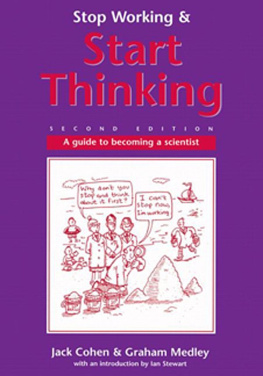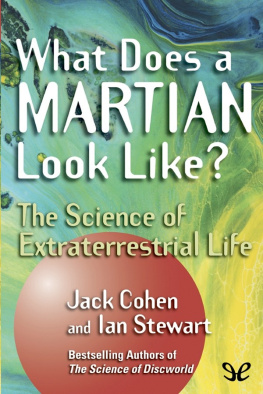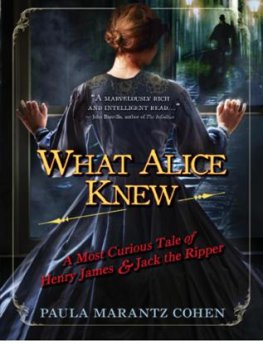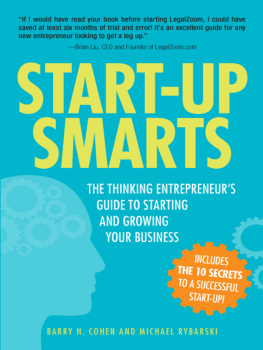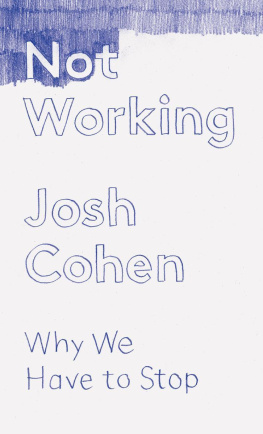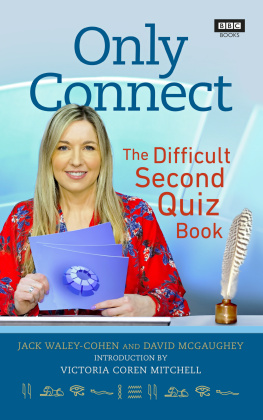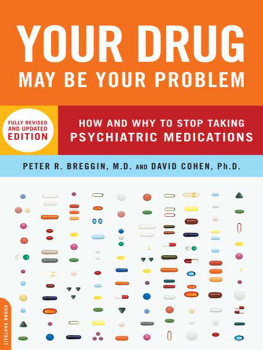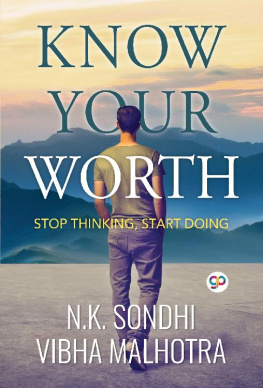Jack Cohen - Stop Working & Start Thinking
Here you can read online Jack Cohen - Stop Working & Start Thinking full text of the book (entire story) in english for free. Download pdf and epub, get meaning, cover and reviews about this ebook. year: 0, publisher: Taylor & Francis, genre: Science. Description of the work, (preface) as well as reviews are available. Best literature library LitArk.com created for fans of good reading and offers a wide selection of genres:
Romance novel
Science fiction
Adventure
Detective
Science
History
Home and family
Prose
Art
Politics
Computer
Non-fiction
Religion
Business
Children
Humor
Choose a favorite category and find really read worthwhile books. Enjoy immersion in the world of imagination, feel the emotions of the characters or learn something new for yourself, make an fascinating discovery.
- Book:Stop Working & Start Thinking
- Author:
- Publisher:Taylor & Francis
- Genre:
- Year:0
- Rating:3 / 5
- Favourites:Add to favourites
- Your mark:
- 60
- 1
- 2
- 3
- 4
- 5
Stop Working & Start Thinking: summary, description and annotation
We offer to read an annotation, description, summary or preface (depends on what the author of the book "Stop Working & Start Thinking" wrote himself). If you haven't found the necessary information about the book — write in the comments, we will try to find it.
Jack Cohen: author's other books
Who wrote Stop Working & Start Thinking? Find out the surname, the name of the author of the book and a list of all author's works by series.
Stop Working & Start Thinking — read online for free the complete book (whole text) full work
Below is the text of the book, divided by pages. System saving the place of the last page read, allows you to conveniently read the book "Stop Working & Start Thinking" online for free, without having to search again every time where you left off. Put a bookmark, and you can go to the page where you finished reading at any time.
Font size:
Interval:
Bookmark:
Stop Working &
Start Thinking
SECOND EDITION
A guide to becoming a scientist

Stop Working &
Start Thinking
SECOND EDITION
A guide to becoming a scientist
Jack Cohen & Graham Medley
with an introduction by Ian Stewart

Published by:
Taylor & Francis Group
In US:270 Madison Avenue
New York, NY 10016
In UK:4 Park Square, Milton Park
Abingdon, OX14 4RN
2005 by Taylor & Francis Group
First published 2000; Second edition published 2005.
ISBN: 0415368308
This book contains information obtained from authentic and highly regarded sources. Reprinted material is quoted with permission, and sources are indicated. A wide variety of references are listed. Reasonable efforts have been made to publish reliable data and information, but the author and the publisher cannot assume responsibility for the validity of all materials or for the consequences of their use.
All rights reserved. No part of this book may be reprinted, reproduced, transmitted, or utilized in any form by any electronic, mechanical, or other means, now known or hereafter invented, including photocopying, microfilming, and recording, or in any information storage or retrieval system, without written permission from the publishers.
A catalog record for this book is available from the British Library.
Library of Congress Cataloging-in-Publication Data
Cohen, Jack.
Stop working & start thinking : a guide to becoming a scientist / Jack Cohen and Graham Medley ; with an introduction by Ian Stewart.
p. cm.
Includes bibliographical references and index.
ISBN 0-415-36830-8 (alk. paper)
1. Research--Psychological aspects. 2. Research--Methodology. I. Title: Stop working and start thinking. II. Medley, Graham. III. Title.
Q180.55.P75C64 2005
001.42--dc22
2005011103
Editor: | Elizabeth Owen |
Editorial Assistant: | Chris Dixon |
Production Editor: | Karin Henderson |
Design & page layout: | Erika Pennington |
Printed by: | Biddles Ltd, Kings Lynn, UK |
Printed on acid-free paper
10 9 8 7 6 5 4 3 2 1

Contents
ANOVA (analysis of variance)
hCG (human chorionic gonadotrophin)
IgG (immunoglobulin G)
RIC (random is clumped)
Postgraduate students (variously referred to as postgraduates and Ph.D. students throughout this book) get lots of technical support and advice throughout their studentships. You, the postgraduate scientists, are our principal audience. Texts are already available to help you through the process how to think (and it is), but we cannot help but believe that it is necessary.
Many graduands and others at various stages of their careers have applied to do research with us. JC had a series of questions at interview, different for each applicant but with a common theme. One of the usual questions was What do you do for exercise? and it got a range of answers, from country walks and jogging five miles before breakfast to swimming, often nothing or not enough! Not physical exercise, JC would explain, Youre not joining us for an Olympic medal; what mental exercise do you do? It surprised nearly all of them that mental exercise was a required part of the training (but nearly all of them enjoyed Zen and the Art of Motorcycle Maintenance and/or Gdel, Escher, Bach: An Eternal Golden Braid when/if they got around to reading them).
Development of an individual from an undergraduate to fully-fledged researcher requires a change in mindset; it is not simply a matter of writing a thesis. As far as we are aware, a Ph.D. is the only degree that qualifies you to teach the same degree: there is no higher qualification in science related, as the understanding of the process of scientific research is itself enough to enable you to instruct others through the same maze. We offer you some helpful pointers through this path.
Your studentship is also the only time in an academic career (or, perhaps, the last time in your life) that you can legitimately avoid administrative (and teaching) duties. Use it wisely. Although we realise that financial pressures usually make up for the lack of other commitments, you should see your scientific development as your main goal and compromise it at your peril. Much is expected of you: you must produce a thesis, a new mindset, and scientific advancement.
The ideal is that the Ph.D. candidate knows more about his/her subject than anybody else in the world. When the candidate comes in to the viva voce examination, the examiners are hoping to help the student expose this. The thesis is the bread and butter of the procedure, and will sit in the library. The oral examination is that occasion when the worthy student is provoked into demonstrating the almost complete mastery of his/her subject, generating new and interesting questions like never before or again. This is what the examiners examine for their jam, cheese, meat, and occasionally caviar they certainly dont do it for the pay!
Certainly in the UK, and generally elsewhere, postgraduates are the lifeblood of scientific advance. It is usually Ph.D. students who are given the riskier projects (i.e. those that might not produce publications), and may find themselves more often at the boundaries of human knowledge. Even if you feel that your supervisor and the original project are keeping you from these boundaries, you should be striving for them. Imagine a supervisor whose last three students studied, respectively, the effects of A on X, B on X and C on X. Guess what project is lined up for you! But there will be a frontier near there, too, if you can find and expose it.
There is, of course, a potential conflict here: initially, a supervisor tends to see project and student as two separate entities. But a successful student is one who merges these two into a single entity. Initially, the student will see the supervisor and project as inextricably linked. But a successful student is one who disentangles these two into separate entities.
Only if you think that the project can produce research that will change peoples minds should you start it. Ask yourself, Where is the Nature paper in this? One of our aims is to help you answer this question. Most of our chapters address ways of thinking about research, about experimental design, for example, and being sensible about statistics.
of problems.
) too.
We, being biologists, have written this book for biologists, but we hope it may be more generally useful for scientists, and, possibly, social scientists. We apologise here for the necessary biological jargon we use in our examples, particularly names of organisms; you other scientists arent going to be examined on these, so you can forget them as soon as youve understood our point. The biologists ought to know the names anyway, and a (smaller and smaller, we fear) fraction of them will actually have seen living examples. A more polemic view of this book is that we are attempting to wrest the influence on the design of experiments away from statisticians and back to biologists. We continue to be amazed at the lack of statistical understanding demonstrated by biology postgraduates, and indeed biologists generally. Statistics (like protein chemistry or radiation physics; X-ray crystallography or knowledge of real ecosystems: natural history) brings many tools to bear on biological problems. This lack of understanding, we feel, is due to the lack of explanation of the role of statistics within biological experiments. We hope to correct this, so that you can use statistics more constructively, not only after the results are in but also before you actually do anything, while there is thinking time. (Yes, we know this turns our title around; we dont mind this, nor will you.)
Next pageFont size:
Interval:
Bookmark:
Similar books «Stop Working & Start Thinking»
Look at similar books to Stop Working & Start Thinking. We have selected literature similar in name and meaning in the hope of providing readers with more options to find new, interesting, not yet read works.
Discussion, reviews of the book Stop Working & Start Thinking and just readers' own opinions. Leave your comments, write what you think about the work, its meaning or the main characters. Specify what exactly you liked and what you didn't like, and why you think so.

